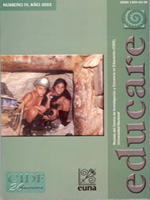Cuando mi centro educativo es una cárcel y mis estudiantes son privados de libertad: una reconstrucción de la práctica docente en el Centro de Formación Juvenil Zurquí
DOI:
https://doi.org/10.15359/ree.2003-4.7Abstract
This article is part of a broader research which was developed as a requirement to obtain the degree of licenciate in Education Sciences with emphasis in Social Studies Didactis. The study had the aim of characterizing pedagogical practices at the Centro de Formación Juvenil Zurquí, a youth jail located in San Luis de Santo Domingo de Heredia, by means of a qualitative research. In other words, its objective was to study the specific learning conditions in that environment, the what, how and why of education, the learning individuals, the learning process characteristics within a closed penitentiary system, and finally, it questions the conditions that characterize and differentiate this center from other education centers.
The aggregated value of this work is that in rebuilding the teaching practice and remaking it theoretically, applying a qualitative research approach, the teacher becomes a researcher of his own education practice; besides, he or she gets involved in curriculum research and institutional dynamics; that implies an active interaction between the researching teacher and his (her) informants.
References
Ausubel, David y otros. Psicología Educativa: Un punto de vista cognitivo. Segunda Edición: Editorial Trillas, México, 1983.
Constitución Política. Publicaciones Jurídicas, San José, 1995.
Costa Rica. Ministerio de Justicia y Gracia. Equipo Técnico del Centro de Formación Juvenil Zurquí. La intervención especializada en el Centro Juvenil Zurquí a Población identificada con características de difícil manejo "Sección
D Mixta". Heredia, 2000.
DIRECTORA l. Entrevista. Heredia, 2000
DIRECTORA 2. Entrevista. Heredia, 2000.
CARA CORTADA. Entrevista personal a profundidad. Heredia, 2000.
CARA CORTADA. Observación. Heredia, 2000
DOCENTE 1. Entrevista 1. Heredia, 2000
DOCENTE 2. Entrevista 1. Heredia, 2000
DOCENTE 3. Entrevista 1. Heredia, 2000
DOCENTE 4. Entrevista 1. Heredia, 2000
DOCENTE 5. Entrevista en Profundidad. Heredia, 2000
DOCENTE 5. Entrevista en Profundidad. Heredia, 2001
DOCENTE 1. Entrevista 2. Heredia, 2000
DOCENTE 2. Entrevista 2, Heredia, 2000
DOCENTE 3. Entrevista 2, Heredia 2000
FUT-FUT. Entrevista personal a profundidad. Heredia, 2000
FUT-FUT. Observación. Heredia, 2000.
Instituto Costan-icense De Enseñanza Radiofónica. Aprendamos a estudiar con "El maestro en casa: una guía para jóvenes y adultos que ingresan a la Educación Abierta. San José: I.C.E.R., 2000.
Mora, D. Ada Luz. Dirección Nacional y Atención a la Población Penal
Juvenil. San José: Ministerio de Justicia y Gracia, Junio 2000.
PSICÓLOGA. Entrevista. Heredia 2001.
RENE. Entrevista personal a profundidad. Heredia, 2000.
RENÉ. Observación. Heredia, 2000.
RENÉ. Carta. Heredia, 2001
Rodríguez León, Edgar. Plan de atención técnica correspondiente al área de servicios educativos. San José, 1992.
Rojas, Norberto. Lineamientos para el mejoramiento de los servicios educativos del Centro de Orientación Juvenil Luis Felipe González Flores. Tesis de graduación para optar el grado de Licenciatura en Ciencias de la Educación con énfasis en Administración Educativa: Universidad de Costa Rica, San José, 1996.
UNICEF. Ley de Justicia Penal Juvenil de Costa Rica. San José: UNICEF, 2000.
VIGILANTE 1. Entrevista. Heredia, 2000
VIGILANTE 2. Entrevista. Heredia, 2000
Published
How to Cite
Issue
Section
License
1. In case the submitted paper is accepted for publication, the author(s) FREELY, COSTLESS, EXCLUSIVELY AND FOR AN INDEFINITE TERM transfer copyrights and patrimonial rights to Universidad Nacional (UNA, Costa Rica). For more details check the Originality Statement and Copyright Transfer Agreement
2. REUTILIZATION RIGHTS: UNA authorizes authors to use, for any purpose (among them selfarchiving or autoarchiving) and to publish in the Internet in any electronic site, the paper´'s final version, both approved and published (post print), as long as it is done with a non commercial purpose, does not generate derivates without previous consentment and recognizes both publisher's name and authorship.
3. The submission and possible publication of the paper in the Educare Electronic Journal is ruled by the Journal’s editorial policies, the institutional rules of Universidad Nacional and the laws of the Republic of Costa Rica. Additionally, any possible difference of opinion or future dispute shall be settled in accordance with the mechanisms of Alternative Dispute Resolution and the Costa Rican Jurisdiction.
4. In all cases, it is understood that the opinions issued are those of the authors and do not necessarily reflect the position and opinion of Educare, CIDE or Universidad Nacional, Costa Rica. It is also understood that, in the exercise of academic freedom, the authors have carried out a rogorous scientific-academic process of research, reflection and argumentation thar lays within the thematic scope of interest of the Journal.
5. The papers published by Educare Electronic Journal use a Creative Commons License:















 The articles published by Educare Electronic Journal can be shared with a Creative Commons License:
The articles published by Educare Electronic Journal can be shared with a Creative Commons License: 



